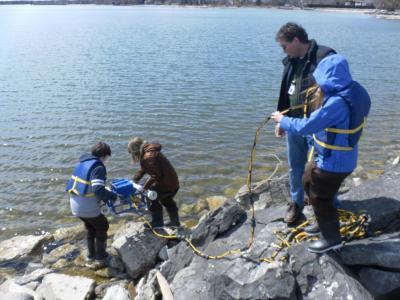Bob Thomson and Liz Thomson are not only a dynamic mentor-mentee education team, but also a father-daughter team. As a former Alpena Public Schools’ student, Liz Thomson participated in Bob’s Thunder Bay Watershed Project. She monitored water quality, tracked invasive species, studied marine debris, contributed to native fish restoration projects, and more in support of water conservation and the Thunder Bay Watershed Project.
Bob has long served as a teacher leader with the Center for Great Lakes Literacy network, a Sea Grant-led network engaging in collective learning to promote Great Lakes literacy among educators and students. His students partner regularly with Michigan State University Extension and Michigan Sea Grant. In 2017, Bob was recognized as the Science Educator of the Year by the Michigan Science Teachers Association.
Liz’s passion for water studies and teaching led her to Michigan State University, and then back to northeast Michigan’s Alcona Community Schools as a middle school teacher. In this first year of teaching, Liz empowered 120 seventh- and eighth-grade students in coastal wetland and water studies. The educational and stewardship goals of these projects are modeled and supported by Bob, who is serving as her mentor teacher.
These students exemplify what Great Lakes literacy learning, mentorship, and place-based education practices at their best can achieve.
These projects are supported by Michigan Sea Grant through the Center for Great Lakes Literacy teacher mentorship program and the National Oceanic and Atmospheric Administration, with funding support from the GLRI, the local Northeast Michigan Great Lakes Stewardship Initiative, and the state’s MiSTEM Network.


